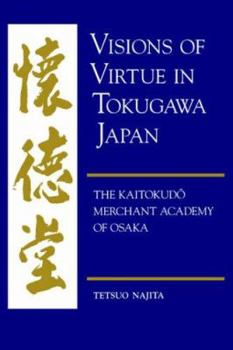Visions of Virtue in Tokugawa Japan: The Kaitokudo Merchant Academy of Osaka
Select Format
Select Condition 
Book Overview
No Synopsis Available.
Format:Paperback
Language:English
ISBN:0824819918
ISBN13:9780824819910
Release Date:August 1997
Publisher:University of Hawaii Press
Length:344 Pages
Weight:1.15 lbs.
Dimensions:0.8" x 6.0" x 9.1"
Customer Reviews
1 rating
Right on the Money!
Published by Thriftbooks.com User , 18 years ago
This book is a well-researched and finely written scholarly work that really jars our standard picture of Tokugawa Japan. You know, the samurai governed and so concerned themselves with Confucian philosophy and ethical issues while the disenfranchised merchants blew their money in the pleasure quarters after a hard day's work, presumably complacent in this arrangement--so the story goes, but Najita shows us many different merchant thinkers in Japan's early modern moneymaking hub, Osaka, dealing with the crucial sociopolitical, economic issues of the day guided by their own distinct take on Confucian ideas and ideals (which included developing a rationale for this kind of philosophising on their part in the first place). These thinkers include the founders of the Kaitokudo Academy in 1726, Miyake Sekian and Nakai Shuan; then later scholars and teachers like Tominaga Nakamoto, Goi Ranju, Nakai Chikuzan, Nakai Riken, Kusama Naokata, and Yamagata Banto. Their interaction with other scholars like Ito Jinsai and Ogyu Sorai is also discussed, and we thereby get a fuller sense of their participation in the intellectual world of Tokugawa Japan and of what their particular contribution to that world was. Anyone interested in Japan at all should read this book. I would especially recommend it to anyone interested in Japanese intellectual history or political economy. Also, if you want to know more about one of the finest and most underrated of cities, Osaka, you won't want to miss this.





